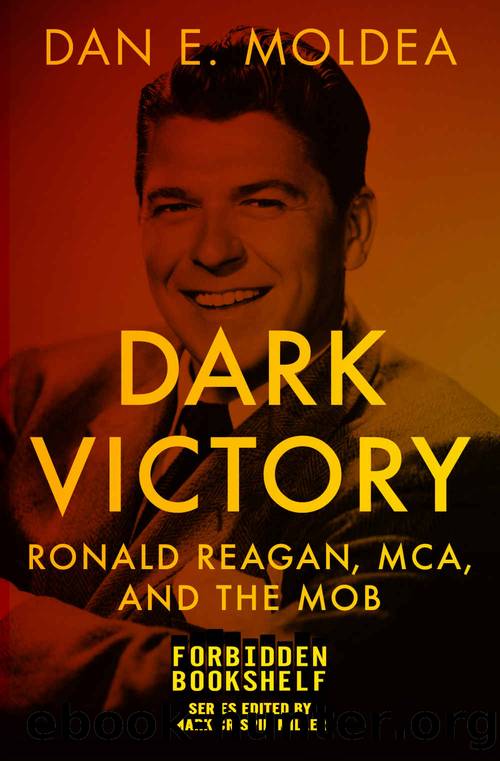Dark Victory: Ronald Reagan, MCA, and the Mob (Forbidden Bookshelf) by Dan E. Moldea

Author:Dan E. Moldea [Moldea, Dan E.]
Language: eng
Format: azw
ISBN: 9781504037679
Publisher: Open Road Media
Published: 2017-04-17T16:00:00+00:00
CHAPTER TWENTY-FOUR
When Ronald Reagan regained his memory, he would eventually recall the events of that afternoon on February 5, 1962. Three years later—in his 1965 autobiography, Where’s the Rest of Me?, which he coauthored with Richard C. Hubler—Reagan wrote that he “had spent a long, unhappy afternoon being interrogated by a federal lawyer who’d seen too many Perry Masons. Feuding is a mild word to use when one is talking of our government’s campaign against a private business concern.…
“Once on the stand, he launched into a series of questions such as, ‘Do you recall a discussion at a Guild board meeting the night of August 16, 1950 (ten years ago), regarding a waiver.…’ Well, of course, I was not only caught off-guard but … I’d lived a lifetime of meetings, and to pick out one for specific questioning was like asking a fellow in a sawmill accident which tooth of the buzz saw cut him first. Before the day ended I was pretty red-necked.”1
On February 13, a week after Reagan’s testimony, the Antitrust Division subpoenaed the Internal Revenue Service for the income tax returns of Ronald and Nancy Reagan for the years 1952–55, the same period that the MCA blanket waiver was approved and reaffirmed while both of the Reagans were on the SAG board. The income tax returns of John Dales and his assistant, Chet Migden, and four members of the 1952 SAG board were also subpoenaed. However, no charges were filed against anyone.
Two days later, Leonard Posner learned from one of his key sources that MCA was receiving information from the grand jury.
“You mean from witnesses who have appeared?” Posner asked.
“No,” his source replied. “MCA has a means of obtaining information from the grand jury itself.”
However, when Posner tried to track down the leak on the grand jury, he was unsuccessful.2
On March 7, Posner interviewed another industry source with inside knowledge of the MCA-SAG blanket waiver. When asked how the MCA waiver affected competing talent agencies, the source replied that “the effect was drastic” and that the other agencies “could not compete against a talent agency which could promise jobs in television shows.… The talent was assured that they would get network exposure if they appeared in a Revue production. They could only get into a Revue production by joining MCA.”
Posner wrote that his source told him that “Reagan may have been given the role of host, a most desirable plum, in GE Theater in return for having lent his good offices to see that MCA got the blanket waiver. He explained it this way: Reagan in 1952 was at the end of the road as far as [his] motion picture career was concerned. He was having a rough time.… Within a short time later, the concept of GE Theater apparently developed and after some months of preparation, the series went into production. [The source] thought it likely that Reagan had been given a promise of the role as host of GE Theater as consideration for his keeping actors in line.
Download
This site does not store any files on its server. We only index and link to content provided by other sites. Please contact the content providers to delete copyright contents if any and email us, we'll remove relevant links or contents immediately.
The Kite Runner by Khaled Hosseini(4409)
Gerald's Game by Stephen King(3913)
The Perils of Being Moderately Famous by Soha Ali Khan(3781)
Dialogue by Robert McKee(3573)
Story: Substance, Structure, Style and the Principles of Screenwriting by Robert McKee(2981)
The 101 Dalmatians by Dodie Smith(2931)
The Pixar Touch by David A. Price(2735)
Confessions of a Video Vixen by Karrine Steffans(2668)
Fantastic Beasts: The Crimes of Grindelwald by J. K. Rowling(2539)
How Music Works by David Byrne(2519)
Harry Potter 4 - Harry Potter and The Goblet of Fire by J.K.Rowling(2412)
Slugfest by Reed Tucker(2411)
The Mental Game of Writing: How to Overcome Obstacles, Stay Creative and Productive, and Free Your Mind for Success by James Scott Bell(2388)
Wildflower by Drew Barrymore(2114)
Scandals of Classic Hollywood: Sex, Deviance, and Drama from the Golden Age of American Cinema by Anne Helen Petersen(2104)
Casting Might-Have-Beens: A Film by Film Directory of Actors Considered for Roles Given to Others by Mell Eila(2071)
Screenplay: The Foundations of Screenwriting by Syd Field(2051)
Robin by Dave Itzkoff(2002)
The Complete H. P. Lovecraft Reader by H.P. Lovecraft(1970)
